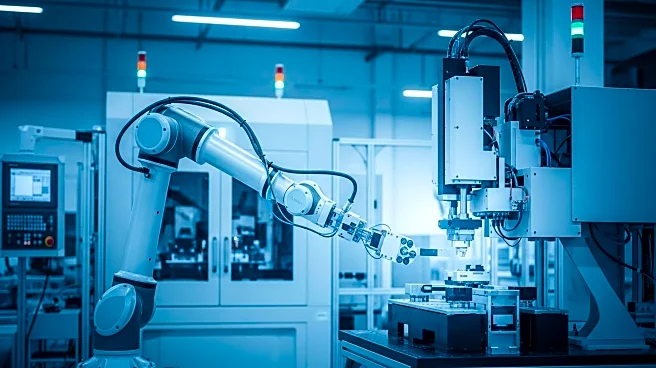What is the story about?
What's Happening?
IndustryWeek's latest review highlights several key developments in the manufacturing sector, focusing on the integration of artificial intelligence (AI) with lean practices. The review discusses how AI can enhance lean transformations, although it is not a standalone solution. It emphasizes the importance of a deliberate and testable framework for incorporating AI into lean activities. Additionally, the review covers various topics such as the revitalization of a neighborhood in Buffalo, New York by a battery manufacturer, the role of foreign-born workers in maintaining the U.S. workforce, and the importance of safety culture in manufacturing. The review also notes the increased union activity and the need for employers to update their labor relations strategies.
Why It's Important?
The integration of AI into lean manufacturing practices is significant as it can potentially increase efficiency and productivity in the industry. By supercharging lean transformations, AI can help manufacturers optimize processes and reduce waste, leading to cost savings and improved competitiveness. The focus on safety culture highlights the ongoing need to prioritize worker safety, which is crucial for maintaining operational efficiency and employee well-being. The discussion on foreign-born workers underscores their vital role in sustaining the U.S. manufacturing workforce, which is essential for economic growth. Additionally, the increased union activity suggests a shift in labor dynamics, prompting employers to reassess their strategies to address worker concerns.
What's Next?
Manufacturers may continue to explore AI applications to enhance lean practices, potentially leading to more widespread adoption of AI technologies in the industry. Companies might also focus on strengthening their safety cultures to ensure compliance and protect workers. As union activity increases, employers may need to engage in more proactive labor relations strategies to address worker demands and prevent disruptions. The role of foreign-born workers in the manufacturing sector may prompt discussions on immigration policies and workforce development initiatives to support industry growth.
Beyond the Headlines
The integration of AI into manufacturing not only impacts operational efficiency but also raises ethical considerations regarding job displacement and the need for workforce reskilling. As AI technologies become more prevalent, manufacturers may face challenges in balancing technological advancements with human labor needs. The emphasis on safety culture reflects broader societal concerns about workplace safety and the ethical responsibility of employers to protect their employees. The discussion on foreign-born workers highlights cultural and policy dimensions, including immigration debates and the importance of diversity in the workforce.
















